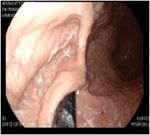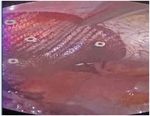Management and Repair of Diaphragmatic Hernia during Pregnancy with a Double Approach
←
→
Page content transcription
If your browser does not render page correctly, please read the page content below
International Journal of Minimal Access Surgery
Case Report
Management and Repair of Diaphragmatic Hernia
during Pregnancy with a Double Approach
Martinez M, Fernández J, Sánchez P, Morales G, Lorenzo JM, Hernández PL and Salinas T*
Department of Thoracic Surgery, General Surgery, Gynecology and Gastroenterology, Hospital Español, Mexico
Abstract
Diaphragmatic Hernia (DH) is considered when the abdominal viscera shift into the thoracic cavity, it is classified into three categories: congenital, acquire and
traumatic. One-third of the patients are symptom-free, it can lead to a high mortality rate, ranging from 22% to 80% if strangulation occurs. The patient with dia-
phragmatic hernia may be asymptomatic until the late weeks of gestation. DH is a rare complication during pregnancy, which is associated with poor prognosis;
it is thought that it has to be treated by early surgery, during the second trimester. We describe the management of a pregnant woman at 27 weeks gestation with
a left diaphragmatic hernia with gastric strangulation with a multidisciplinary treatment.
Keywords: Diaphragmatic hernia; Pregnancy; Laparoscopic fundoplication; Thorax
Case Presentation
A 30-year-old woman (Gravida 3, Caesarea 1, Abortion 1) at 27
weeks gestation, she has a history of a laparoscopic fundoplication 5
years after because a hiatal hernia, was admitted to our emergency
department at 29 weeks gestation for acute dyspnea and chest pain,
it has a 2 weeks symptoms with Postprandial fullness on early satiety,
progressive dysphagia to solids, oppressive type epigastric pain,
shortness of breath, weight loss of 6 Kgs. Vital signs with moderate
distress respiratory rate 26 bpm, systolic blood pressure of 100 mmHg
and a diastolic blood pressure of 60 mmHg, heart rate 95 bpm, and
body temperature at 36.7ºC. Physical examination revealed reduced
breath sounds over the lungs with tympani to percussionon the left
side. A chest radiograph demonstrated a left herniation of the stomach
and bowel to the thorax (Figure 1). Figure 1: Chest X-rayon admission.
An endoscopy was performed up on admission, finding gastric
fungus migration to chest with gastric torsion and gastropathy, the
initial management was made by an endoscopy (Figure 2), at that time
there was no evidence of fetal distress, ultrasound studies and fetal
focus record were performed. Laboratory test showed in the Hematic
Biometry a HC 8 g/dl Htc 24% Pl 236 × 103/µL WBC 5.9 × 103/µL
Biochemistry test Gl 84 mg/dl Alb 2.3 g/dl Cr 0.7 mg/dl. The patient
was admitted to the maternal unit.
Because of the stable vital signs and less abdominal pain it was
treated on the basis of liquid nutrition with polymeric Formula,
Citation: Martinez M, Fernández J, Sánchez P, Morales G, Lorenzo
JM, Hernández PL, et al. Management and Repair of Diaphragmatic
Hernia during Pregnancy with a Double Approach. Int J Clin Med Case Figure 2: Endoscopic study to release the gastric torsion.
Rep. 2020; 1(1): 1003.
Copyright: © 2020 Martinez M intravenous Iron Therapy, during the first two weeks, the diet was
Publisher Name: Medtext Publications LLC progressed to chopped foods and the observation was continued for
a week more, was discharged at 30 weeks gestation with pulmonary
Manuscript compiled: Feb 07th, 2020
maturation scheme blood count 10 g/dl Alb 3.1g/dl and a weight gain
*Corresponding author: Tania Salinas, Department of Thoracic of 4 Kg.
Surgery, General Surgery, Gynecology and Gastroenterology, Hospital
Pregnancy was interrupted at 36 weeks gestation because the
Español, Mexico, E-mail: taysalinasb@gmail.com
patient started again with weight loss and lack of fetal growth, a
© 2020 - Medtext Publications. All Rights Reserved. 04 2020 | Volume 1 | Article 1003International Journal of Minimal Access Surgery
cesarean section was performed, a live baby girl was delivered with
2,390 Kgs, an Apgar 9/9, breast feeding was established, a minimally
invasive procedure was performed with double simultaneous approach,
abdominal approach was made by 4 ports, and the thoracic approach
was made by a single port (Figure 3). A defect in the diaphragm of 10
cms × 10 cms with gastric and intestinal involvement of the thorax was
identified, the hernia was reduced releasing adhesions in the thorax
and the previous fundoplication was dismantled, the diaphragmatic
defect was repaired with interrupted sutures, it was complemented
by a gastric fundoplication (Figure 4 and 5). A mesh was placed
via thorax and fixed by stapler, simple suture points was fixed with
the pleura to cover the hiatus (Figure 6), drains were placed in both
cavities, the patient presented a good evolution at the second day was
mas a fluoroscopic swallow study without reporting leakage or reflux Figure 6: Mesh placed via thorax and fixed by stapler.
(Figure 7), liquid diet was started and progressed to chopped food
at the third day, intrathoracic drainage was removed at the fifth day,
the patient was discharged at the seventh day. A fluoroscopy swallow
study was made a month after the surgery as a control (Figure 8).
Figure 7: Fluoroscopic swallow study at the second day after surgery, the
application effect is observed, the mesh placed by thorax, left plural drainage.
Figure 3: Surgery with double simultaneous approach for minimal invasive, 5
ports at abdominal approach and thoracic uniportal technique.
Figure 4: Diaphragmatic hernia defect closure, interrupted sutures were
placed.
Figure 8: Fluoroscopic swallow study was made a month after the surgery
as a control.
Discussion
It Is described three categories of DH: Congenitala-raising from a
faulty embryologic development, Acquired, that is developed at points
of anatomical weakness (esophageal hiatus, aortic or caval openings)
and Post Traumatic, caused by a direct lesión or indirect trauma, DH
during pregnancy can be presented in all of the three categories, with
a similar incidence (40%, 30%, 30%) [1-3].
In the Literary review we found 34 cases of diaphragmatic hernia
Figure 5: Redu-Fundoplication. in pregnancy 30 of them were operated within the second and third
trimesters, 20 (66%) have been operated on an emergency 11 cases
© 2020 - Medtext Publications. All Rights Reserved. 05 2020 | Volume 1 | Article 1003International Journal of Minimal Access Surgery
(55%) were due to a strangulated organ, 9 of 34 cases reported fetal References
death, in 5 of this 9 cases maternal deaths also occurred [4]. From 1. Chen Y, Hou Q, Zhang Z, Zhang J, Xi M. Diaphragmatic Hernia during pregnancy:
our perspective, we believe that this condition puts at risk the life of A case report with a review of the literature from the past 50 years. J Obstet Gynaecol
the fetus and the mother if it is not attended at the right time under Res. 2011;37(7):709-14.
a multi disciplinary group, were commend that the management of 2. Kushlan SD. Diaphragmatic Hernia in pregnancy: significance and danger. Conn
patients be determined by their clinic, as discussed in these reports State Med J. 1951;15(11):969-78.
using different alternatives to stable the mother condition so the
3. Yetkinel S, Peksen Ç, Kiziltan R. Symptomatic Bochdalek Hernia in Pregnancy: A
surgery can be delayed as long as possible [5-8]. Therefore, antenatal
Rare Case Report. Case Rep Surg. 2017;2017:2862149.
corticosteroids for fetal maturity should be administered to the
mother before the surgery if the gestational age is between 24 and 4. Julien F, Drolet S, Lévesque I, Bouchard A. The Right Lateral position for laparoscopic
34 weeks [8]. Gastric decompression might improve the clinical Diaphragmatic hernia Repair in Pregnancy: Technique and Review of the Literature.
J Laparoendosc Adv Surg Tech A. 2011;21(1):67-70.
condition of the pregnant patient with a diaphragmatic hernia who
presents with symptoms and signs of obstruction [6,8]. Standard 5. Kurzel RB, Naunheim KS. Repair of an asymptomatic diaphragmatic hernia during
vaginal delivery should be avoided in these cases because the increase pregnancy. Obstet Gynecol. 1988;71:869-71.
in the intra abdominal presser may further displace the vicar and 6. Fleyfel M, Provost N, Ferreira JF, Porte H, Bourzoufi K. Management of diaphragmatic
result in strangulation of the herniated viscus [9,10]. hernia during pregnancy. Anesth Analg. 1998;86(3):501-3.
It should be considered a simultaneous abdominal and thoracic 7. Fardy HJ. Vomiting in late pregnancy due to diaphragmatic hernia. Case report. Br J
approach since this approach provides greater security for dissection Obstet Gynaecol. 1984;91(4):390-2.
and tissue management makes more complete the repair [10]. 8. Genc MR, Clancy TE, Ferzoco SJ, Norwitz E. Maternal Congenital Diaphragmatic
In our review, we found the use of mesh [11-14], in our case we Hernia Complicating Pregnancy. Obstet Gynecol. 2003;102(5 Pt 2):1194-6.
report the placement via thoracic as a complement of the repair via 9. Luu TD, Reddy VS, Miller DL, Force SD. Gastric Rupture Associated With
abdominal way. We believe that in this case, it was possible to repair Diaphragmatic Hernia During Pregnancy. Ann Thorac Surg. 2006;82(5):1908-10.
the diaphragm in a second time since the patient remained stable at
10. Kaloo PD, Studd R, Child A. Postpartum diagnosis of maternal diaphragmatic hernia.
all times, during pregnancy after de endoscopy the patient did not
Aust N Z J Obstet Gynaecol. 2001;41(4):461-3.
present data of a new event of gastric torsion, intestinal suffering for
respiratory compromise. 11. Thoman DS, Hui T, Phillips EH. Laparoscopic diaphragmatic hernia repair. Surg
Endosc. 2002;16(9):1345-9.
We do not recommend an aggressive operative approach if the
12. Yamaguchi M, Kuwano H, Hashizume M, Sugio K, Sugimachi K, Hyoudou Y.
patient is stable, the uterine enlargement can cause displacement of
Thoracoscopic treatment of Bochdalek hernia in the adult: Report of a case. Ann
the abdominal viscera but this growth is slow and gradual so in some Thorac Cardiovasc Surg. 2002;8(2):106-8.
cases, it can be accommodated in a certain position that does not
13. Willemse P, Schütte PR, Plaisier PW. Thoracoscopic repair of a Bochdalek hernia in an
affect the patient.
adult. Surg Endosc. 2003;17(1):162.
Conclusion
14. Sano A, Kato H, Hamatani H, Sakai M, Tanaka N, Inose T, et al. Diaphragmatic
The management of pregnant patients with diaphragmatic hernia with ischemic bowel obstruction in pregnancy: report of a case. Surg Today.
hernia depends on the clinical presentation and gestational age. It is 2008;38(9):836-40.
recommended by al the therapeutic tools to carry a higher gestational
age before surgical treatment. It is recommended the use of mesh as
a complement to the closure of the hernia defect. We consider that
the double approach is the best option since this provides better
control of structures. We recommend performing the procedure in
a minimally in evasive way because of the direct vision it provides, a
better dissection and it can be done simultaneously abdominal and
thoracic.
© 2020 - Medtext Publications. All Rights Reserved. 06 2020 | Volume 1 | Article 1003You can also read






















































